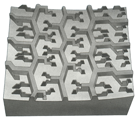|
PTFE
The first
coating material applied by Caw was PTFE, which stands for poly-tetra-fluoro-ethylene.
In South Africa this is often referred to by the Du Pont
trade name of TEFLON 8. In the early stages it was mainly applied for use in the
textile industry. Today it is applied to a wide variety of articles in the manufacturing
industry where its non-stick, heat resistant properties are of use. For
the best results with regard to these two properties, the article has to be baked
at 400° C. Although the PTFE is present as
a continuous film it is not often useful as a corrosion resistant
coating as it is micro-porous. Other systems where the PTFE is present as a pigment
in the resin, can be applied at a lower temperature. These may have better abrasion
and corrosion resistance than the high-bake type.
|
|
|
Special Coating
Some plastics not available in paint
systems can be applied using powder coating techniques.
E.g. Gun Coat, Nylons, polyethylene and PVDF These have good corrosion
resistance and can be more than half a millimeter thick provided the
substance has sufficient heat capacity. PCDF coatings have exceptional abrasion resistance.
|

|
|
|
Non-stick
Very few solid
substances will
permanently adhere to a "Teflon" finish.
And while tacky materials may show some adhesion,
almost all substances release easily.
|
Low coefficient of friction
The coefficient of friction of "Teflon"is generally in the range
of 0.05 to 0.20,
depending on the load, sliding speed and particular "Teflon" finish
used.
|
Non-wetting
Since "Teflon"
surfaces are both
oleophobic and hydrophobic, they are not
readily wet. Clean-up is easier, more thorough and in many cases self-cleaning.
|
|
Heat-resistance
There is no decomposition of PTFE below 205° C (400° R;
insignificant decomposition between 205° C and 290° C (400°
F and 550° F) which requires no special precautions. Between 290° C and 315° C (550°
F and 600° F) intermittent service is possible with adequate ventilation.
|
Unique electrical properties
Over a wide range of
frequencies, "Teflon" has high dielectric strength,
low dissipation
factor, and very high surface resistivity.
By special techniques, it can even be made
conductive enough to be used as an anti-static
coating.
|
Cryogenic stability
Many "Teflon"
finishes will withstand
severe temperature extremes without loss
of physical properties. "Teflon" may
be considered for use at temperatures as low as —270° C (-450° F).
|
